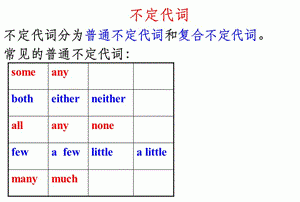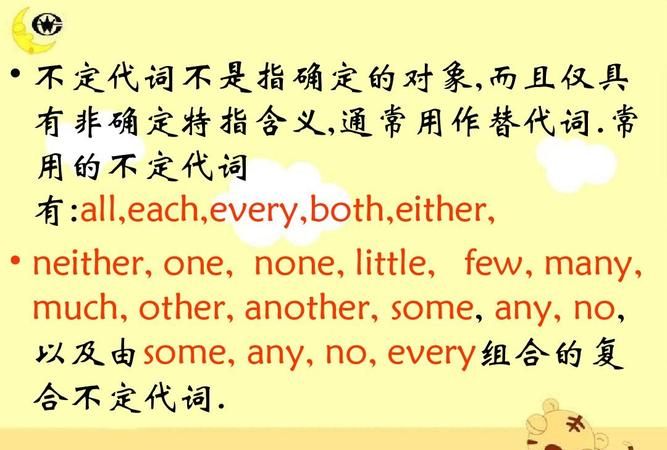本文目录
不定代词的用法
不定代词:不指明代替任何特定名词或形容词的代词叫做不定代词。
常见的有:
some, somebody, someone, something, any, anybody,anyone, anything, no, nobody, no one, nothing, all, both, neither, none, either,each, every, everybody, everyone, everything, other, another, much, many, few, a few, little, a little,one等等。
不定代词的功能:
1、 做主语:
Is everybody here?
All is well and ends well.
Nobody else said anything.
2、 做宾语:
I know a little about the novel.
I am speaking for myself, not for others.
Here are two books,you can take either of them.
3、 做表语:
That’s all for today.
It’s too much.
I’m not somebody, I’m nobody.
4、 做定语:
Each book on the shelf is worth reading。
Let me have another cup of tea.
Many people attended the meeting.
5、 做状语:(部分代词)
The film lasted some two hours.
Ts she any better today?
They will come back a little later.
all, ever, each
each,可以指小到两个,all、every 则至少指三个。
all 表所有项目的总和,是一个不可分割的整体。
eg:All the students contributed to the fund.
every 是由各个项目集合而成一个整体,其构成成分有共性。
eg:every child in the class passed the exam.
each 的注意力集中在个别项目上,其构成成分各具特性。
eg:I asked all the children,each told a different story.
注意: 修饰单数可数名词包括集体名词,一般用the whole.
eg:The whole pie was eaten.
The whole class was invited to the party.
some, any
any和some 皆表示不定量,都可接可数和不可数名词。any 多用于疑问句、否定句,有时也用于肯定句;some多用于肯定句,偶尔也用于疑问句。
any
1、Are there any stamps in the drawer?
2、He did not make any mistakes in his spelling.
3、He came without any money。
4、She kissed her brother,but was afraid to ask any questions.
5、We had no idea that any serious losses had been inflicted on the company.
some
Some people are early risers.
The mother is doing some washing now.
I read about it in some book.
Are there some stamps in the drawer?(说话人知道,只是想证实而已)
I do not like some of them.(部分)
Would you like some beer?
everybody, everyone, one
everybody/everyone和every 一样,都含有“各个”的意思,但前者多指所有的人;后者多指说话人所熟悉的人。
everybody/everyone
eg:
Everybody’s business is nobody’s business.
In here everyone is a comrade.
one:泛指人时相当于you,we等。
One does not like to have one’s word doubted.(美语中,常用his 代替 one’s)
no one ,none
no one 仅指人,none 可以指人也可指物。no One= nobody
eg:No one failed the exam.
No one come to see me.
none:
None of the students failed the exam.
None but the lonely heart can know my sorrow heart.
both,two
强调两个人或物时(不止是一个),才用both。
eg:
There were two dogs on the porch.
Both were fast asleep.
The two of them were invited.
Notice will be sent to the two of you.
other,another
other常与复形名词以及单形不可数单词连用分别表示复念和零念。当前面加上“the, this, that, some, any, each, every, no, none, one, or ”以及形容词性物主代词时,表示单念。
eg:
Jones is here,but where are the other boys?
Moral beauty ought to be ranked above all other beauty.
Each member must bring on other person.
She only comes every other day.
I read it in some book or other.
Any other person than her husband would have lost patience with her.
other 有复数形式:others
We should not think only of our own children, there are others to cared for also.
The search party was divided into two groups. some went to the right, others went to the left.
another:表示单念,可数,做定语时后接单形名词或代词one.
Do not say another word.
Where can we find another like her?
This pen does not work i must buy another.
Tell them I am not very well. I will go and see them another day.
注意:another day 指未来,the other day指过去。

英语不定代词的用法总结
不是指明代替任何特定名词或形容词的代词叫做不定代词。常用的不定代词有:some, any, all , none, both, either, neither, each, every, other, another, much, many, few, little, one 等。下面笔者就几个典型不定代词进行分析。 1. both 全部,都,不定代词both指两个人或事物。可以用作主语、宾语、定语或同位语。例如: Both would like to go swimming.(作主语) We invited both to come to our farm.(作宾语) Both films are interesting.(作定语) They both like skating.(作they的同位语) 2. none 无人或无物不定代词none的含义和all相反,和no one,not any同义,但其用法相当于名词,在句子中一般作主语或宾语。它代替不可数名词作主语时,谓语动词用单数形式;代替可数名词作主语时,谓语动词用单、复数皆可。例如: None of the problems is/are easy to solve. (作主语,代替可数名词) None of the money is mine. (作主语,代替不可数名词) I know none of them.(作宾语) 注:不定代词none表示"三个或三个以上都不……",所以汉语的"我们(三人以上)都不去"译成英语为"None of us will go ."而不能译成"All of us will not go."后者译为"我们并不是个个都去。" 3. either 两者之中的任何一个不定代词either可以作主语、宾语和定语。例如: Either of them will agree to this arrangement.(作主语) Here are two books. You can borrow either of them.(作宾语) I believe either method will work. (作定语) 4. neither 两个之中一个也不是不定代词neither是either的否定形式,可以作主语、宾语和定语。例如: Neither is interesting. (作主语) -Did you see Mary and Jack? -No, I saw neither of them.(作宾语) I think neither book is worth reading.(作定语) 注:a. 不定代词neither表示"两个都不",所以汉语的"我俩都没去那儿"译成英语为"Neither of us went there."而不能译成 "Both of us did not go there."后者意为"我俩没都去那儿"。 b. 肯定形式的动词+neither=否定形式的动词+either。例如: I like neither of them.=I don't like either of them. 5. other 其他的,另外的不定代词other相当于名词或形容词,可以在句中作主语、宾语、定语等。相当于名词时,有复数形式 others,还有所有格形式 other's 和others'。不定代词 other之前常用冠词 the。例如: He has two daughters . One is a teacher, the other is a nurse.(作主语) Some will go swimming, others will go shopping.(作主语) I have two pictures of the Great Wall here. You have seen one. Now I'll show you the other .(作宾语) There are other ways of helping him out of difficulty.(作定语) 6. another 另一个,又一个another是由an和other合并构成,因此,它只能代替或修饰可数的单数名词,前面不再用冠词。不定代词another可以在句中作主语、宾语、表语和定语。例如: One is blind, another is deaf, and a third is lame.(作主语) This shirt is too small for me. Please show me another . (作宾语) She is a fool, and her husband is another.(作表语) Would you like another cup of milk? (作定语) You will have to stay here for another five days.(作定语,five days形式上是复数,但意义上是单数,可以和another连用) 7. one 1)不定代词one指不定人称,表示人,译为"人","一个人"等。它有反身代词oneself和所有格形式one's。 2)不定代词one也可以用来代替前面出现过的可数名词,以免重复。它有复数形式ones,可以与冠词连用,可以有自己的定语。 不定代词one可以在句中作主语或宾语;one's只能作定语。例如: One has to do one's best. (one 作主语,one's作定语。) Please give me the book, the one on the desk. (one作宾语)

不定代词的三种用法
不定代词是不指明代替任何特定名词或形容词的代词。
常见的不定代词有以下两类:
A. 限定性代词:
all, each, both, either, neither, one, none, little, few, many, much, other, another, some, any等。

B. 复合性代词,即由some, any, every, no 与body,one, thing构成的十二个合成词:
somebody, anybody, everybody, nobody.
someone, anyone, everyone, no one.
something, anything, everything, nothing.
1. 意思:both两者都,neither两者都不,either两者中任何一个
2. 作主语:both后面的谓语动词用复数。neither, either后面的谓语动词用单数。
1) Both of them are here today.
2) Neither of us is a doctor.
3) Either is OK.
初中英语不定代词的用法总结
【some】用法:
1、some作“一些”“一点”解时,用于肯定句,若用于疑问句,表示期待肯定回答、请求或建议;作“某个”、“某一”解时,用于修饰单数名词;作“相当多的”解时,可修饰不可数名词,形容量不少,通常和表示时间、距离等之类的名词连用,也可修饰抽象名词来表示某种程度; 在非正式语体里,some也可表示“极好的,了不起的,相当不错的”,用来加强语气。
2、some修饰可数名词单数(多为人、物、时间、地点等普通名词)时,不可再使用冠词a。
3、some在句中只用作定语,无比较等级。
【any用法】:
1、any用作形容词的基本意思是“任何一个〔一些〕”,指在三个或三个以上的事物中,强调“无论哪一个”; 作此解时,一般用于肯定结构,其后多半修饰不可数名词或单数可数名词,很少修饰复数可数名词。
2、any还可作“一点,一些”解,指某一特定的环境下相对而言的一小部分,引申还可表示“丝毫的,略微的”; 作此解时,主要用在疑问句、条件从句及否定句中或者与含有否定意义的词连用,代替some,当期待一个肯定的回答或要鼓励人家说“是”时,在疑问句中也可用作some,在条件句中用some比any更肯定些;作此解时,后可接复数可数名词或不可数名词。
3、any在句中只能用作定语。
4、any other跟比较级连用时,后面一般跟单数名词表示最高级。
5、any用作形容词时不用于比较等级。

【none】用法:
1、none用作代词时,用以指前文的复数或不可数名词或代词,也可用以指后文的不可数名词或代词,还可与比较级和than连用,表示“无人”。
2、none独立指人时,常用作复数,有时也可用作单数。当其作主语时,谓语动词可用单数形式,也可用复数形式,多用于非正式场合。none of us〔you, them, etc.〕可用作单数,也可用作复数。
【all】用法:
1、all用作形容词的基本意思是“所有的,全部的”,指两种情况:一是表示概括起来考虑的全体,此时与不可数名词或单数形式的可数名词连用; 二是表示把各部分一个一个地来看的全体,此时与复数形式的名词连用。
2、all 与名词连用时,在名词前可使用the〔this, that, those〕或所有格等限定词,若与复数形式的名词连用,名词前也可用基数词。
3、all 与 not 连用有两种含意:一为“并非…都是”;二为“即使全部的…也不”。
4、与such,other等限定词连用时,all应置于其前。
5、all用作形容词时不用于比较等级。
【neither】用法:
1、neither常用在不带冠词的单数名词之前,谓语动词要用单数形式。
2、neither用作代词时表示“两者都不”,可单独使用,用于没有冠词、物主代词、指示代词等限定词修饰的单数名词前,用作主语时,谓语动词用作单数形式,也可以和介词of连用,后接复数名词或人称代词,名词前面一定要有限定词修饰。
3、neither作主语时,谓语动词在大多数情况下用第三人称单数形式,但在neither of...后可以用单数形式,也可以用复数形式。
【either】用法:
1、either用作副词时须放在否定的动词或形容词之后,表示“也(不)”,加强语气。
2、either在口语中有时也可放在否定句中的名词后加强语气。
3、either可以和or连用,表示“或是…或是…”。在连接并列的主语时谓语动词一般和邻近的主语一致;用于否定句中,表示“既(不)…又(不)”。
4、either作代词时,意为“(二者之中)任何一个”,在句中作主语或宾语,表示单数概念;作主语时谓语动词一般用单数形式,但在否定句中常用复数形式。either可单独用,也可和of连用,of后跟复数名词或复数代词,但意义明确时可省略of短语。
以上就是关于不定代词的热身 ,不定代词的用法的全部内容,以及不定代词的热身 的相关内容,希望能够帮到您。

